Field Notes

Information Box Group
Canada’s first sustainable chemistry program
The Department of Chemistry & Chemical Biology launched the first Honours Sustainable Chemistry program ever offered at a Canadian university. Based on the 12 principles of green chemistry developed by American chemists Paul Anastas and John Warner, the program prepares students to become leaders in a zero-carbon economy. “Chemists need to practice environmental stewardship,” says Michael Brook, Faculty of Science Research Chair in Sustainable Silicone Polymers, who helped develop the program. “Our stewardship needs to start in labs and classrooms and continue into industry.” The Hamilton Industrial Environmental Association established an endowed HIEA Scholarship in Sustainability Chemistry to be awarded to undergraduate students in their second to fourth years in the program.
Celebrating science trailblazers
Honorary doctoral degrees in science were awarded during McMaster’s Spring and Fall Convocations to three remarkable women. Julie Angus is a molecular biologist, adventurer, writer and filmmaker who earned her undergraduate degree from McMaster University. She is also the first woman to row across the Atlantic Ocean from mainland to mainland. Anne Innis Dagg is a trailblazing scientist, author and advocate whose work has been transformative in fields from zoology to gender equality. In the 1950s, between earning her Master’s degree in genetics and her PhD in animal behaviour, Anne went to Africa to study the behaviour and ecology of giraffes. Tebello Nyokong, who graduated from McMaster with a Master’s of Science in Chemistry, currently serves as the director of the Nanotechnology Innovation Center at Rhodes University in South Africa.
Making science accessible for all
The Faculty of Science delivered 23 webinars, workshops and training sessions about accessibility to faculty, staff and students on a range of topics from presentation techniques to Word and PowerPoint documents, course outlines and social media.
Prevent, Prepare and Protect
Faculty members Marie Elliot, David Earn, Katie Moisse and Jianping Xu became members of a new international nexus to fight biological threats and avert future pandemics. Based at McMaster, Canada’s Global Nexus for Pandemics and Biological Threats is an international network of scientists, clinical health and medical specialists, engineers, social scientists, history and policy researchers, economics and business experts focused on the shared goal of achieving global health security.
New fund bolsters EDI efforts
Faculty support for equity, diversity and inclusion (EDI) continued with the creation of a new fund for EDI scholarships and research awards. The Dean’s Supporting Equity, Diversity and Inclusion for Scientific Excellence Fund provide students from historically underserved backgrounds with development, training and mentorship opportunities.
Honoring the legacy of Dr. Douglas Davidson
The Dr. Douglas Davidson Technology Training Fund was established by his family to support graduate students in the Department of Biology. Dr. Davidson joined the department in 1969 and served as Chair from 1974 to 1977, then Acting Dean of the Faculty of Science from 1980 to 1981. A world traveler, Dr. Davidson donated his extensive art collection to the McMaster Museum of Art. While Dr. Davidson retired in 1988, he remained actively involved in the department until his passing in 2019.
Professor Emeritus honors wife with gift to students Learn More
Ming-Ko Woo, Professor Emeritus in the School of Earth, Environment & Society, established the Caroline Woo Bursary to support undergraduate students in financial need.
Curating research-inspired playlists
Student ambassadors who volunteer with the McMaster Institute for Music & the Mind stayed busy even after the pandemic shuttered the Institute’s LIVELab performance hall and forced the cancellation of concerts and events. Students first compiled research summaries of how music impacts the brain. They then created research-influenced playlists on Spotify and YouTube delving into a range of topics from sleep and exercise to creativity and meditation.
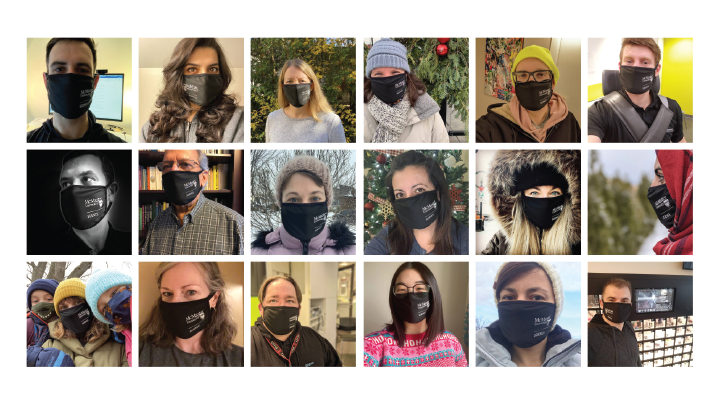
Masking up
In a concerted effort to get people to mask up, faculty and staff donned branded face masks, took indoor and outdoor selfies of themselves, and posted them on social media to encourage others to mask up for the protection of their community.
Research institute assembles all-star symposium
The Origins Institute and Consulat Général de France à Toronto brought together leading astrobiologists for a two-day trans-Atlantic public symposium. The all-women panel of experts included University Scholar Laura Parker and Canada Research Chair in Extragalactic Star Formation Christine Wilson from the Department of Physics & Astronomy, along with PhD candidates, graduate and undergraduate students.
New award empowers BIPOC students
The Physics and Astronomy Research Experience Award will open doors for racialized, Black and/or Indigenous, and other students who identify as people of color to conduct research with faculty members. The award also creates additional opportunities for historically marginalized students to forge meaningful peer and professional networks that will help advance their research interests and career aspirations. The Dean’s Office matched a contribution from an anonymous donor to provide initial funding for the award.
Scholarship established for female BIPOC students
Established by her family and friends, the Philippa Heritage Scholarship supports female undergraduate students in the Faculty of Science who identify as racialized, Black or Indigenous. Philippa, who was an accomplished scientist, a proud two-time McMaster graduate, and dedicated yogi, passed away in 2020. Her daughter, Samantha Heritage, and close friend Marilyn McDermott led the fundraising campaign for the scholarship.
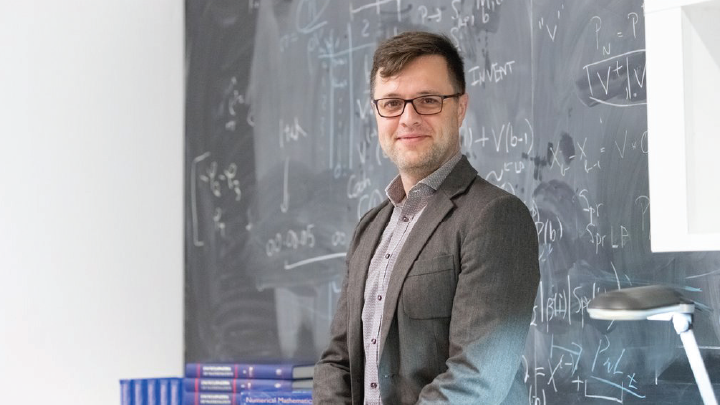
Grasselli plays key role in pandemic problem-solving
Mathematics & Statistics Chair Matheus Grasselli served on the organizing committee for the Symposium on Systemic Recovery hosted by the Fields Institute for Research of Mathematical Sciences. Global experts in economics, mathematics and epidemiology came together to discuss pressing challenges in the wake of the COVID-19 global health crisis. Panelists identified the pandemic as a unique chance to redefine social and economic norms for individuals, companies and governments.
Mathematics & Statistics Chair Matheus Grasselli.
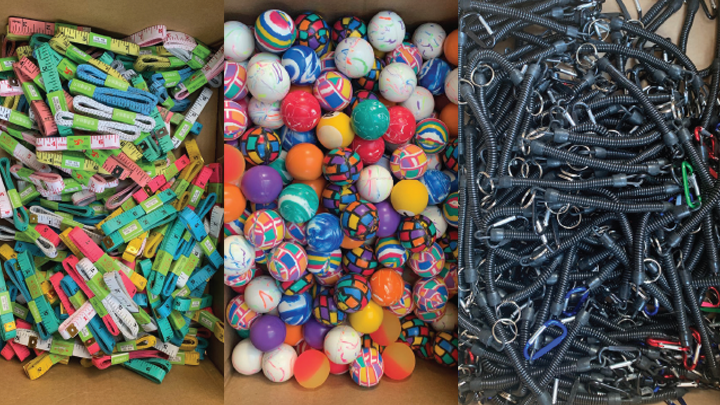
Some assembly required
When teaching labs closed during the pandemic, the Biology and Physics & Astronomy Departments recruited teams of faculty, lab techs, students and staff from across McMaster to create lab kits for students. They sourced, assembled and shipped kits to more than 320 students around the world. Each kit was filled with supplies for three at-home experiments. Students completed their DIY experiments with livestreaming help from teaching assistants.
Physics lab kits were shipped to students around the world.
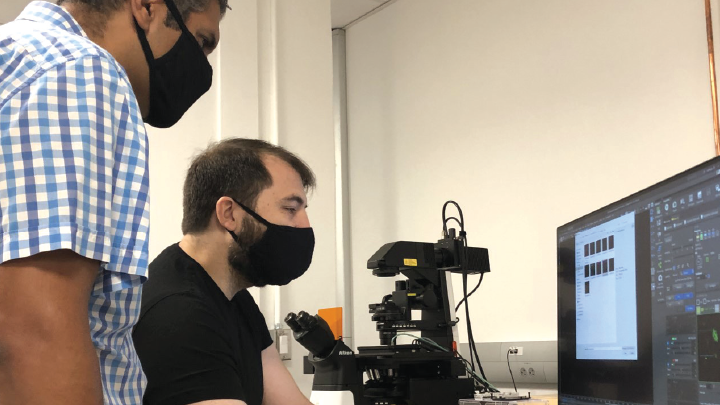
Keep CALM and research on
The Faculties of Science, Engineering and Health Sciences celebrated the opening of the Centre for Advanced Light Microscopy (CALM), a new core research facility providing faculty and students with reliable and affordable access to top-tier microscopes and leading-edge research technologies like photo-patterning and light-assisted 3D printing. Created with Nikon as the first strategic partner, it will serve as a hub for interdisciplinary collaboration and technical training. McMaster is the only Canadian university to establish centres for both light and electron microscopy across from one another in the same building.
CALM’s Scientific Director Jose Moran-Mirabal (standing) with Facility Manager Joao Pedro Bronze de Firmino.
Faculty members launch online research training series
When the pandemic restricted in-person lab time, Kinesiology assistant professors Trevor King, Jeremy Walsh and Baraa Al-Khazraji established a virtual, interactive training series for graduate students. “The students really brought the magic,” says Baraa. “They fully engaged with the material and generously shared their thoughts and perspectives.” The trio plans to introduce more sessions on cardiovascular physiology critical thinking and communication to boost proficiency in engaging with scientific literature.
Neutron Beam Lab secures major funding
The McMaster Nuclear Reactor’s Neutron Beam Lab is getting three new neutron beamlines thanks to a $14.25 million boost from the Canada Foundation for Innovation. Bruce Gaulin (Physics & Astronomy) was awarded the funding for his Building a Future for Canadian Neutron Scattering project. The Beam Lab is the sole source of neutrons for more than 40 Canadian research institutions. Bruce and his team are also leveraging their nuclear research to facilitate developments in clean energy, cancer research, antibiotic resistance and quantum technology software.
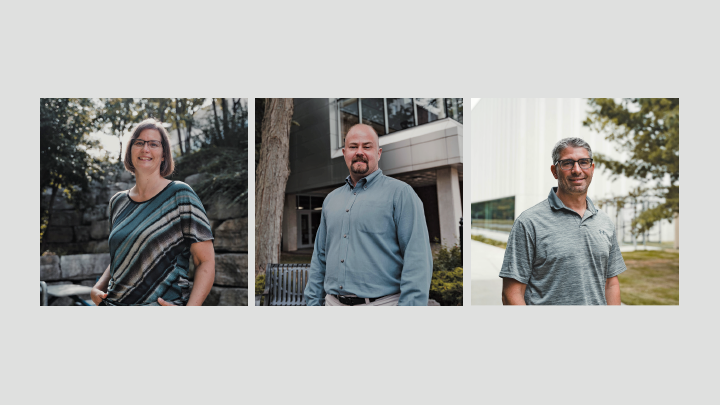
Appointments to key leadership positions
Juliet Daniel was appointed Associate Dean, Research & External Relations. Three new Chairs were also appointed: Alison Sills in the Department of Physics & Astronomy; Gianni Parise in the Department of Kinesiology; and Mel Rutherford in the Department of Psychology, Neuroscience & Behaviour. Jonathan Stone was appointed Director of the Origins Institute.
New Department Chairs Alison Sills, Mel Rutherford and Gianni Parise.
New program matches co-op ambassadors with students
Science Career and Cooperative Education launched a program to connect seasoned co-op students with students just starting their co-op work terms. The co-op ambassadors answer questions and share their experiences working with employers. Students connect with the ambassadors at events and can reach out directly for one-on-one advice.
New lab store lowers cost of research supplies
To meet the growing need for affordable and reliable access to essential lab supplies and chemicals, the Faculties of Science and Engineering, together with the Provost’s Office, opened the new Lab Stores on campus. Available to all McMaster faculty and student researchers, the facility buys supplies in bulk to help lower costs while eliminating delivery wait times for researchers and freeing up space in labs where supplies were previously stockpiled.
Faculty members benefit from $2.25 million investment in research
Juliet Daniel with the Department of Biology together with Katherine Bujold and Sarah Styler with the Departments of Chemistry and Chemical Biology were among nine McMaster researchers to receive New Frontiers Research Fund Exploration Awards. The fund was created by the Government of Canada to support world-leading interdisciplinary, international, high-risk/high-reward, transformative and rapid-response Canadian-led research, with awards of up to $250,000 over two years.

Four new Canada Research Chairs
Alemu Gonsamo (Remote Sensing of Terrestrial Ecosystems), Jennifer Heisz (Brain Health and Aging), Gita Ljubicic (Community-Engaged Research for Northern Sustainability) and Gabriel Xiao (Perceptual Development) each received five years of government funding for their breakthrough research initiatives, with the potential to renew their grants for a second five-year term. The Canada Research Chairs Program invests up to $311 million each year to attract and retain some of the world’s most accomplished and promising minds.
The Faculty of Science’s newest Canada Research Chairs from top left, clockwise: Gita Ljubicic, Alemu Gonsamo, Gabriel Xiao and Jennifer Heisz.
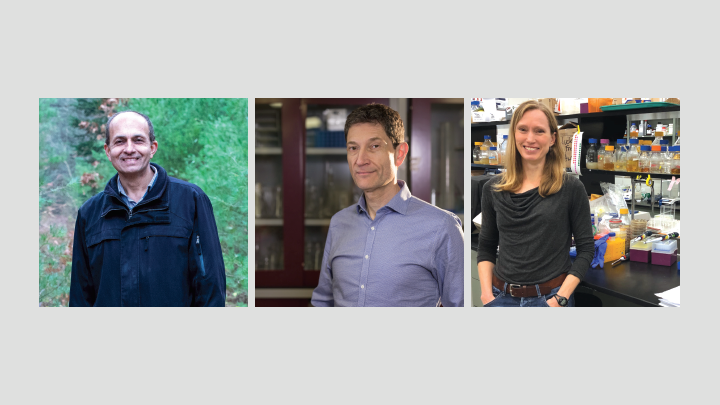
Three Science Research Chairs awarded
David Earn (Mathematical Epidemiology), Altaf Arain (Environmental Sustainability and Climate Change) and Marie Elliot (Microbial Development and
Natural Product Control) are the latest faculty members to be awarded Faculty of Science Research Chairs. Each Chair receives a three-year research grant dedicated to funding graduate student help and supplies, as well as a one-term teaching sabbatical to focus on their respective research projects. Nine Faculty of Science Research Chairs have been awarded since 2019.
Newest Science Research Chairs, from top: David Earn, Altaf Arain and Marie Elliot.
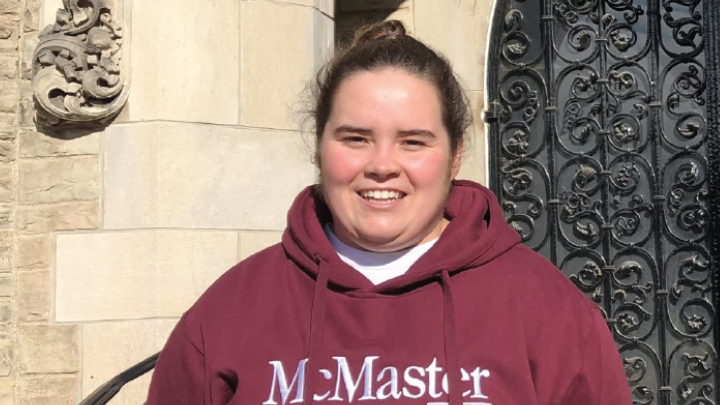
From Northern Ontario to McMaster with Canada’s most coveted STEM scholarship Learn More
Seventeen-year-old Nadia Breault was emptying trash cans on the shoreline of Timiskaming when she looked at her phone and found an email telling her she was a Schulich Leader and the recipient of an $80,000 scholarship. Nadia immediately called her mother. “I could barely speak, but between my gasps for air and shrieks of glee, she soon figured out the great news,” says Nadia. “I continued cleaning the beach for the rest of the day in a state of shock.”
Schulich Leader Nadia Breault

